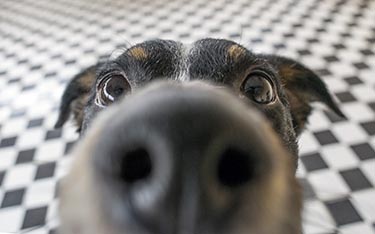Odors That Repel Pets

Pet-offensive odors: What their nose knows, and yours doesn’t
Brewing coffee. A summer campfire. Fresh-cut flowers. Scents like these are a huge part of our lives. They’re linked to our memories, our routines, our preferences and our environment. Unfortunately, most of us never stop to consider the fact that our pets’ ultra-sensitive olfactory senses may not always agree with our own favorite fragrances - many of which are found in the homes we share with our animals. Help your clients understand what scents are a major turn-off for cats and dogs and how to keep everyone happy.
Biology basics
Most of us know that dogs and cats have keen senses of smell. But did you know that dogs have between 150 and 300 million olfactory cells compared to a human’s mere 5 million? Or that a cat’s sense of smell is actually 14 times stronger than ours? With larger and more sophisticated olfactory systems, our animals are able to pick up on all sorts of information about their environment. Cats can stay on alert about other cats in the area and make up for their poor taste buds with smell, while dogs can use smells to identify everything from their owners to drugs, and even diseases like cancer.
The smells that repel
With their super sniffers always on full alert, many seemingly benign household scents can actually agonize our beloved pets. Here’s the rundown on the odors that irk cats and dogs the most.
Dogs despise:
- Citrus: Most of us love the smell of citrus. It’s fresh and bright and can mask other odors we deem unpleasant. But because citrus is so strong, it can irritate a dog’s respiratory tract. Citrus essential oils can be even more bothersome because of their high concentration and intensity.
- Vinegar: This is another standard household item that is strong and almost unbearable to dogs. While apple cider vinegar can be beneficial in cleaning up smelly dogs, make sure to mix it with a pet-friendly shampoo and keep it away from their sensitive noses.
- Chili pepper: The capsaicinoids that make chilis hot can cause itching and irritation in a dog’s nose. At dinnertime, keep human chow made with chili away from their food bowl!
- Alcohol: This strong antiseptic can be too much even for our noses sometimes, which is why it’s best to keep disinfectants, and even alcoholic beverages, out of a dog’s vicinity.
- Nail polish: Acetate, formaldehyde, nitrocellulose — there are some strong chemicals in that little bottle. Dogs hate the smell and equally despise nail polisher remover, especially the kind made with acetone.
- Chlorine and cleaning products: Besides their nasty smell, these chemicals can be potentially toxic if ingested, so it’s important to keep cleaning products out of reach of dogs and all pets. Always be careful to keep pets away from freshly-cleaned surfaces until they’re safely dry.
Cats can’t stand:
- Citrus: Just like their canine counterparts, cats hate oranges, lemons, limes and the like. Some cat repellents even use these smells to help keep cats away.
- Banana: We know the peels can be pungent and cats find this to be especially true. Leaving one out is a sure way to keep a cat out of the room.
- Dirty litter box: Here’s where we can agree with our feline friends — there’s nothing welcoming about a foul-smelling bathroom! Cats won’t go near a dirty box, so make sure to scoop and replace litter in a timely fashion.
- Pepper: Spices and seasonings don’t mesh well with cats’ noses, so keep the curry out of reach!
- Soaps and deodorants: Be careful about cleaning your cat’s food bowls, toys or bedding with anything too fragrant. Cats just don’t care for it.
- Eucalyptus: Like other foliage they instinctively know may be toxic, cats will give eucalyptus plants a wide berth. Be sure to avoid essential oils (including eucalyptus, tea tree, peppermint and more) because they are known to be especially harmful to cats.
While it may be hard for our human senses to understand why dogs would rather roll in the muck and cats want to sleep on stinky shoes, deciphering what odors makes pets want to run and hide is important in reducing animal stress and increasing overall happiness at home.
Let Covetrus help you care for the animals in your community. Visit us online or contact your Covetrus representative at 855.724.3461 to order supplies and medications for your practice.
Sources:
https://www.animalwised.com/top-10-smells-dogs-hate-1568.html
https://www.petpoisonhelpline.com/blog/essential-oils-cats/
https://www.animalwised.com/10-smells-that-cats-hate-672.html
https://www.pbs.org/wgbh/nova/article/dogs-sense-of-smell/
Need Regulatory Assistance
If you need help with regulatory or licensing issues, we're happy to help. We have a wide variety of resources to help you when issues arise.

Careers
Are you looking for a place to let your talents shine? At Covetrus, we help our practitioner customers better serve their patients and take pride in providing the best customer experience possible. Search our open positions to see our available opportunities.
Newsletter
Stay current with what’s going on with Covetrus, subscribe to receive our newsletter and email communications. Subscribers will receive the latest information in practice management, sales and marketing, animal health, and more.


Leave a comment